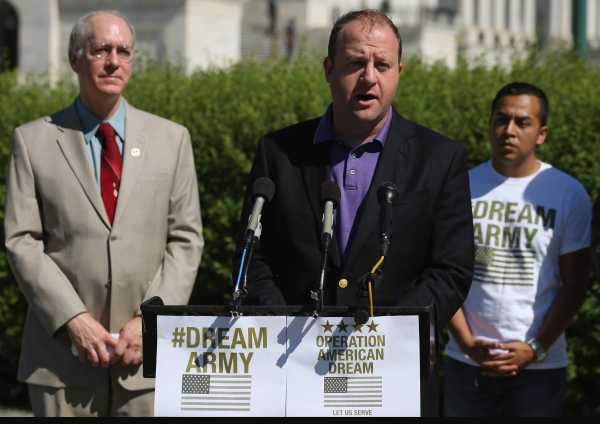
House Republicans are trying to rally support behind a GOP immigration bill that they are calling a “compromise” — one they are expected to vote on by Wednesday.
It’s a bill that in its current form would give immigrants eligible for the Deferred Action for Childhood Arrivals (DACA) program legal status, renewable every six years, and for some, a path to citizenship based on merit; fund the southern border wall; cut legal immigration levels; make it harder to seek asylum; and allow for migrant families to be detained together indefinitely at the border.
What this bill is not is a “compromise.” On policy, this is an immigration proposal based on conservative principles — and one that heeds President Donald Trump’s hardline view of immigrants.
This isn’t a “compromise” that has received any Democratic support or input — and it’s unlikely to. And at the moment, it’s not even the kind of “compromise” that has enough support among Republicans to pass the House. Speaker Paul Ryan’s team delayed a vote on the proposal last week after it became clear that the bill had nowhere close to enough support to pass.
And Republicans are still debating possible changes ahead of an expected vote Wednesday, including adding E-Verify, which requires employers to run a check of prospective workers’ social security numbers. Conservatives, who are withholding support, have already ensured the addition of another border security measure. But they still have issues with how the bill addresses what they call “chain migration,” or family-based legal immigration. The current proposal allows DREAMers with citizenship to sponsor their parents through the immigration process, which hardliners say is rewarding illegal border crossings.
Needless to say, many of these demands would be nonstarters if they were working with Democrats. The bill is a “compromise” in name only — it’s strategic branding on the part of Republican leadership, which desperately wants to show it can do something on the issue. More importantly, it is a sign of just how much Trump has changed the Republican Party’s immigration debate.
This is a pretty conservative proposal being billed as a “compromise”

Ryan’s idea was to let lawmakers “express themselves by voting for the policies they like,” presenting Republicans with two bills to decide between. One was a hardline proposal written by Rep. Bob Goodlatte (R-VA), which gave current DACA recipients three-year renewable visas but did not offer a path to citizenship, defunded so-called “sanctuary cities,” funded the border wall, and included conservative measures like E-Verify. That bill failed last week, losing the support of every Democrat and 41 Republicans.
The second bill is the so-called “compromise,” which, in theory, is meant to bring enough moderate Republicans and conservatives to the table to get passage with just Republican votes. So far, that effort has been flailing. The four lead negotiators are Reps. Jeff Denham (R-CA) and Carlos Curbelo (R-FL), and immigration hardliners Michael McCaul (R-TX) and Goodlatte.
Conservatives in the House Freedom Caucus say the bill is not far enough to the right, but moving the legislation in their direction would lose the support of moderate Republicans — a dynamic we observed during the House’s health care debate last year. Lawmakers took the weekend to negotiate possible provisions like E-Verify and changes to guest-worker visas. While the final details of this “compromise” bill are still uncertain, the contours of the proposal are already much further to the right than anything moderate Republicans have discussed in the past.
Take, for example, the “path to citizenship” offered in this compromise bill, which conservatives argue is a substantial concession and sign of a more liberal Republican Party on immigration. Recipients can apply for a green card after six years of conditional legal status, but they are not guaranteed to receive one — it’s a merit-based system. An analysis by the Libertarian CATO Institute found that only 30 percent of the DACA-eligible population, roughly 420,000 individuals, would benefit from this proposal.
Compare this to a Republican-led bill Curbelo, a moderate Republican now backing this “compromise” bill, proposed earlier this year. His Recognizing America’s Children Act would have given a five-year conditional legal status and then the opportunity to apply for a green card, which would have reached roughly 1.4 million individuals, according to an analysis by the Migration Policy Institute.
But to conservatives, these numbers don’t matter.
“I can tell you the analysis is that the reality is a political reality,” Rep. Mark Meadows (R-NC), the chair of the Freedom Caucus said after questioning the validity of the CATO report. “All the people back home are going to see is the 1.8 million people, or more, are eligible for citizenship. So it’s more a political reality.”
The “compromise” bill is conservative on other fronts as well. It allocates $25 billion in funds for the southern border wall, funding that Congress has so far only allocated gradually and with restrictions. If the funding for the border wall stops being appropriated, the green cards to DREAMers also stop.
And — in perhaps the most striking shift in Republican immigration policy under Trump — the bill cuts legal immigration levels, getting rid of the diversity lottery and curbing what the administration calls “chain migration.” Cutting the so-called chain migration eliminates citizens’ ability to sponsor adult children who are married and brothers and sisters, allocating those visas to employment-based visas.
The bill also takes a hardline approach toward asylum, removing detention protections for children and allowing them to be detained indefinitely with their parents.
In other words, it asks moderate Republicans and Democrats to accept a slew of conservative reforms to almost every arm of the immigration system, legal and illegal, in exchange for a partial and less-than-certain path to citizenship for DREAMers. Already, Democrats have balked at both Republican immigration proposals.
Conservative lawmakers think it’s still not far enough to the right
Interestingly, few “moderates” negotiating the bill have broken from negotiations about the bill as it is — despite it being far more to the right than past Republican-led proposals and far more to the right than anything Democrats are willing to sign onto.
Rep. Will Hurd, a moderate Republican from a border district in Texas, is an exception. He’s come out against the proposal, saying:
Conservatives, however, think the proposal still isn’t far enough to the right.
One congressional aide said conservative lawmakers think the population that would be eligible for conditional legal status is still too broad, and that the proposal does nothing to address sanctuary cities, a broad term for jurisdictions that don’t fully cooperate with the federal government’s efforts to find and deport undocumented immigrants.
Conservative lawmakers have also taken issue with a provision in the bill that allows citizens to sponsor their parents. Conservative groups like the Heritage Foundation have already called it an “amnesty scheme” — a phrase that’s almost the curse of death for any immigration bill trying to gain conservative support.
Conservatives are galvanized by a president in Trump, who is known to espouse hardline immigration views, claiming migrants are “infesting” and “invading” the country. And they have enough votes in the House Republican conference to tank any bill being pushed on a party-line vote. This is the same dynamic we saw during the health care debate.
The result, so far, has been a bill that’s not a compromise at all.
For an immigration bill to become law, it needs to be an actual compromise with Democrats

House Republicans are twisting and turning to find consensus among their own ranks. But all this talk about a GOP “compromise” overlooks a more powerful political dynamic at play in Congress: Any bill that can become law needs the support of at least nine Democrats in the Senate.
House Republicans have explicitly said they aren’t taking that into account — for now.
But consider this exchange on the House floor last week between Curbelo and Rep. Jared Polis (D-CO), a libertarian-minded Democrat who has been working with some Republicans on a bipartisan immigration deal.
Curbelo was arguing for members of the House, both Democrat and Republican, to vote in favor of the Republican bill. Polis’s response demonstrates the weakness of the proposal as “compromise”:
Polis here is referring to the several bipartisan bills that have been crafted in the House, including by Curbelo and Denham — now sponsors of the GOP “compromise.”
Something that’s been clear all along is that Republicans had no intention of gaining Democratic support in this debate. Democrats were not involved in negotiations or policy writing. This “compromise” bill will not be going through a normal committee process where Democrats could offer amendments. It will also not be allowed to be amended on the House floor.
Republicans are engaging in a partisan exercise. And so far, they haven’t gotten very far.
Sourse: vox.com






